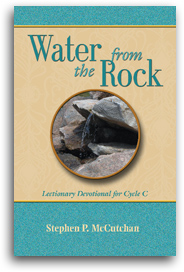Epiphany 5 / Ordinary Time 5
Devotional
Water From the Rock
Lectionary Devotional for Cycle C
Object:
In the year that king Uzziah died, I saw the Lord sitting on a throne, high and lofty ...
-- Isaiah 6:1
Uzziah, also known as Azariah, had such a long and successful reign in Judah that for many it would have been difficult to remember when he was not their king. Imagine having the same president for fifty years. Whether you liked or disliked some of his decisions, you would become accustomed to a society structured and ruled over by him. Then suddenly this figure that had dominated the governing of your society for as long as you could remember dies. Uzziah's death signaled a major change in Judah's society. All the familiar structures that shaped life were suddenly subject to change. At times of major change, people lose their sense of security. With that new vulnerability, there is often an openness to the spiritual dimension of life. For Isaiah, it was an experience of God and a strong sense of call in his life. The framework of this experience has provided an outline for reformed worship. We come into the sanctuary and encounter the holy with a sense of awe and praise. "Holy, holy, holy is the Lord of hosts; the whole earth is full of his glory."
It is natural, when we do have the sense of divine presence, to feel our own sense of inadequacy and the need to confess our sinfulness. "Woe is me! I am lost, for I am a man of unclean lips, and I live among a people of unclean lips." In our liturgy, the confession of sins is immediately followed by an assurance of forgiveness. "Now that this has touched your lips, your guilt has departed and your sin is blotted out." Having been assured of our forgiveness, we are now prepared to hear the word of God proclaimed. In that proclamation, we hear God's call in our lives. "Whom shall I send, and who will go for us?" Having heard that call, we are invited to make an offering or response. "Here am I; send me!" Yet even as we offer ourselves, the resistance of the world to God's word confronts us. "Keep listening, but do not comprehend." The benediction is a prayer for and an assurance of our hope in the midst of a resistant world. "The holy seed is in its stump." Every week we relive in the liturgy the basic outline of the spiritual journey of our lives and in doing so find our place in the larger story of God.
-- Isaiah 6:1
Uzziah, also known as Azariah, had such a long and successful reign in Judah that for many it would have been difficult to remember when he was not their king. Imagine having the same president for fifty years. Whether you liked or disliked some of his decisions, you would become accustomed to a society structured and ruled over by him. Then suddenly this figure that had dominated the governing of your society for as long as you could remember dies. Uzziah's death signaled a major change in Judah's society. All the familiar structures that shaped life were suddenly subject to change. At times of major change, people lose their sense of security. With that new vulnerability, there is often an openness to the spiritual dimension of life. For Isaiah, it was an experience of God and a strong sense of call in his life. The framework of this experience has provided an outline for reformed worship. We come into the sanctuary and encounter the holy with a sense of awe and praise. "Holy, holy, holy is the Lord of hosts; the whole earth is full of his glory."
It is natural, when we do have the sense of divine presence, to feel our own sense of inadequacy and the need to confess our sinfulness. "Woe is me! I am lost, for I am a man of unclean lips, and I live among a people of unclean lips." In our liturgy, the confession of sins is immediately followed by an assurance of forgiveness. "Now that this has touched your lips, your guilt has departed and your sin is blotted out." Having been assured of our forgiveness, we are now prepared to hear the word of God proclaimed. In that proclamation, we hear God's call in our lives. "Whom shall I send, and who will go for us?" Having heard that call, we are invited to make an offering or response. "Here am I; send me!" Yet even as we offer ourselves, the resistance of the world to God's word confronts us. "Keep listening, but do not comprehend." The benediction is a prayer for and an assurance of our hope in the midst of a resistant world. "The holy seed is in its stump." Every week we relive in the liturgy the basic outline of the spiritual journey of our lives and in doing so find our place in the larger story of God.


